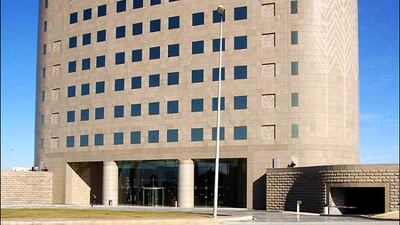SHARM EL SHEIKH // Abu Dhabi Islamic Bank said it has been shortlisted as a buyer for Citigroup's Egypt retail business in what is set to be a heated battle to tap into one of the world's fastest growing economies.
Citi has been leaving countries where it no longer has a competitive edge, while UAE lenders are spreading their wings into nearby emerging markets such as Egypt to boost earnings amid slower growth at home. Mashreq and Emirates NBD are also reportedly bidding to buy Citi’s Egypt consumer banking network.
"We have been shortlisted with a few other banks," said Tirad Al Mahmoud, ADIB's chief executive, on the sidelines of the Egypt The Future economic development conference in Sharm El Shiekh. "It's a competitive bid. It's going to be a very aggressive situation."
“Whoever wins this will have an advantage because Citibank has a good portfolio of clients, they have more than 100,000 credit cards,” he said. “This is something Citi worked on for 15 years and it’s for sale.”
UAE banks are set to feel the pinch from a dramatic drop in oil prices as demand for loans slows, analysts including those at Standard & Poor's have warned. The price of crude, upon which the Arabian Gulf countries fuel their growth, has lost about half its value since last June.
Meanwhile, Egypt, which is coming out of an economic slump after four years of political turbulence during which two presidents were removed following popular uprisings, has attracted a multitude of investors betting on robust growth. The country, a net oil importer, will also get a boost from the drop in crude prices.
At the economic conference on Friday, the country’s president, Abdel Fattah El Sisi, said he expects Egypt’s economy to grow at a rate of 6 per cent annually over the next five years as the country attracts investors through legal guarantees, incentives and cutting red tape.
Last year, the country’s GDP expanded 2.2 per cent, according to the IMF. .
Banks have been at the forefront of those seeking to make money in Egypt, where one in 10 consumers does not have a bank account.
Among the Arabian Gulf lenders that have expanded into Egypt in recent years have been Emirates NBD, Dubai's biggest bank, and Qatar National Bank. Mashreq has been in the country for years, ADIB since 2007 and National Bank of Abu Dhabi for decades. NBAD's chief executive, Alex Thursby, said this month that he plans to overhaul the bank's branch network in Egypt in a bid to drum up more business
“The growth opportunities in Egypt are very good, and I think the current government is focusing on the right things – improving the regulatory environment, the environment for investors,” Mr Al Tirad said.
“I believe that Egypt is the single biggest investment opportunity in the region. If Egypt is able to cross this bridge, and we think it will be able to get into a greener zone for investment, then I think the whole region will benefit.”
Citi, which has also dropped its retail banking businesses in Turkey, Romania, Greece and Pakistan, has said it sees potential in other booming economies such as in Sub-Saharan Africa.
As global banks become subject to more regulation such as Basel III, it will force them to take less risk in various ways, including limiting the amount they can borrow, and they are becoming increasingly picky about where they focus their firepower and what lines of business they chose to get involved in.
mkassem@thenational.ae
Follow The National's Business section on Twitter

